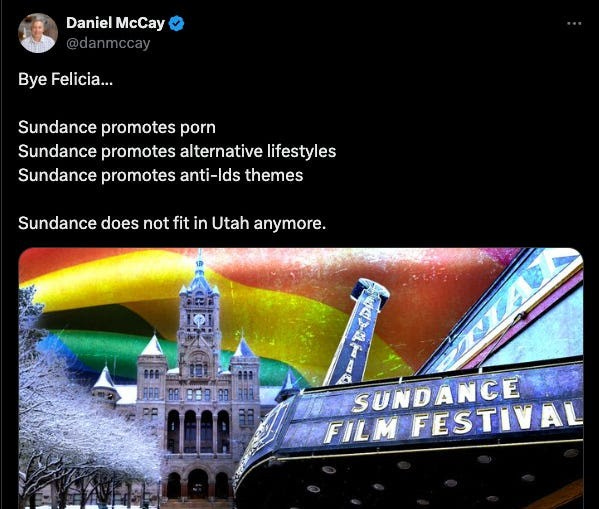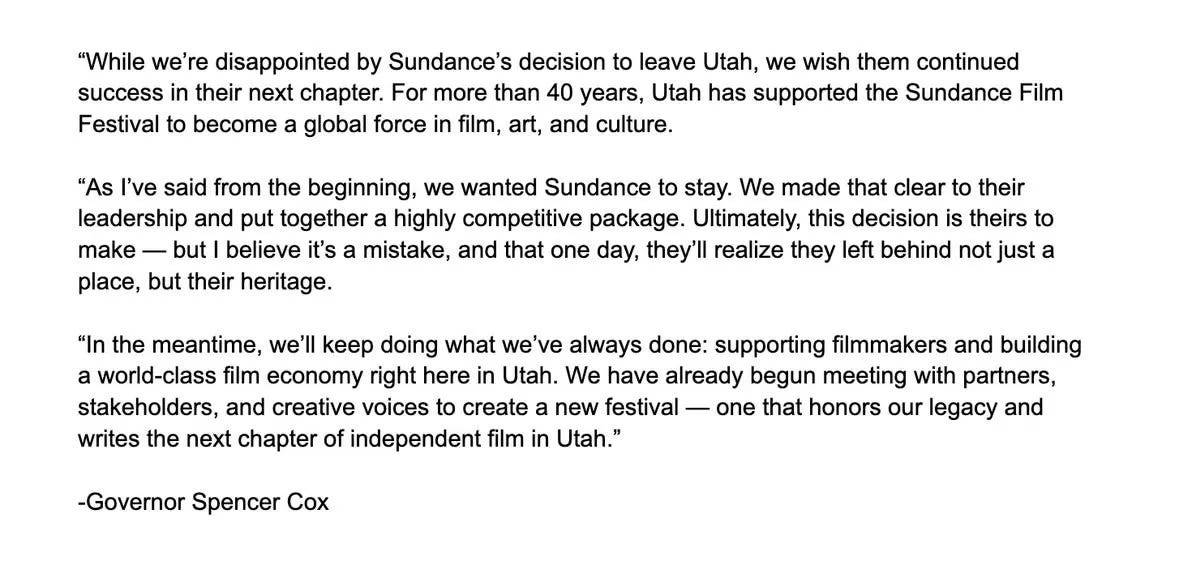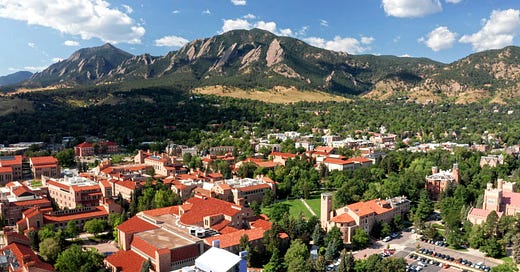BREAKING: Colorado Assembly earmarks funds for Sundance move to Boulder
Utah's institutional loss blamed on queer discrimination, many say
DENVER, Colorado – The Colorado General Assembly just passed a bill that supports relocation of the Sundance Film Festival from Park City, UT to Boulder, according to an Assembly spokesperson in a telephone interview.
“Everybody is really excited about this bill,” said the spokesperson, who asked not to be named. Colorado Gov. Jared Polis has up to 30 days to sign the bill. “And I’m sure he will,” she said.
The bill provides $34 million in refundable tax credits. It does not specifically name SFF, but it specifically says the bill is aimed for a “film festival entity with a multi-decade operating history and a verifiable track record of attracting 100,000 or more in-person ticket sales and over 10,000 out-of-state and international attendees” that begins relocation to Colorado by Jan 1, 2026.
SFF, the largest independent film festival in the U.S., began in Salt Lake City in 1979 and moved to Park City in 1981. The festival thrived in popularity despite constant pressure from financial problems, internal management clashes, the city’s struggle to accommodate congestion in its streets and infrastructure, plus a 2019 sex abuse scandal that imprisoned a festival founder, according to a January 2023 post on Park City’s history Web site.
Speculation that the festival intended to leave Utah began as early as July 2023, as reported in the film industry publication Deadline Hollywood. At that time, SFF representatives denied the rumors. But SFF’s contract with Park City would end with the 2026 season, and Deadline claimed to have insider information that the organization was already “fielding bids from a handful of cities to relocate the festival.”
By April 2024 the rumors had been confirmed, according to an April 2024 Deadline follow-up article. SFF board members and stakeholders felt the pending contract expiration was ripe fruit for redefining the 40-year old festival, and put out a nation-wide Request For Information that month seeking options to relocate.
Park City and Salt Lake City teamed up to enter the bidding, submitting a joint RFI in hopes of keeping the festival in Utah because, tradition and heritage notwithstanding, local and state economies had much to lose – money – according to the April 2024 Deadline report.
The annual festival brought in more than $138 million during the 11-day event in 2024 via lodging, meals, entertainment, ticket sales, skiing, and shopping. Utah residents spent about $246 per day, while non-Utahn attendees spending an average of $735 per day, according to the 2024 Sundance Film Festival Impact Report.
Actual earnings were higher than the estimate, the SFF Impact Report stated, because data for spending activities such as official festival sponsors, unaffiliated businesses, airport taxes and visitors who return to Utah as a result of attending the festival was not available for inclusion in the report.
Deadline reported in the April 2024 article that Park City Mayor Nann Worel and other unnamed sources said that the city would work with state and local partners to devise a package of incentives and infrastructure to win the bid. The eventual committee included Park City, Visit Park City, Summit County, Salt Lake County, Visit Salt Lake, the state of Utah, Salt Lake City, and Utah’s philanthropic community, according to a snapshot prepared by Utah News Dispatch.
Utah shmoozed with a tasty $165 million package that included $15 million per year for 10 years, a $10 million one-time lump sum if Utah won the bid, $3.5 million from the State, and $2.8 million from private donors.
Utah and Boulder, Colorado were the last two competitors standing, out of at least 15 bids, according to several news reports. SFF announced Boulder as the winner on Thursday, March 27.
Much speculation surrounds the reason for the move, the decision to choose Boulder over Park City, and the timing of the decision.
SFF vision statement says it supports work that will “push creative boundaries, spark new levels of empathy and understanding, and even lead to social change.” Its 2025 lineup included 53 LGBTQ+ filmmakers.
Some residents and many advocacy groups claim that Utah’s religiously conservative political climate – its perceived intolerance for anything “alternative” – was a major reason SFF picked Boulder, but neither SFF nor Utah state lawmakers have publicly admitted whether this is true.
Even though the Utah legislature earmarked $3.5 million to support the bid to keep Sundance in Utah, it passed a bill banning LGBTQ flags on government property, which many warned could lead SFF to leave the state.

On March 27, the same day SFF announced Boulder as its winning pick, Utah’s flag ban bill became law without Utah Gov Spencer Cox’s signature – or his veto.
“I continue to have serious concerns with this bill. However, because a veto would be overridden, I have decided to allow the bill to go into law without my signature, and urge lawmakers to consider common sense solutions that address the bill’s numerous flaws," Cox said in a statement Thursday.
"To our LGBTQ community, I know that recent legislation has been difficult. Politics can be a bit of a blood sport at times and I know we have had our disagreements. I want you to know that I love and appreciate you and I am grateful that you are part of our state. I know these words may ring hollow to many of you, but please know that I mean them sincerely," Cox wrote.
After SFF’s announcement, Cox issued a statement that he was sorry to see the film festival go.

Elevate, a Utah political action committee, promptly likened Cox’s statement to a jilted ex-boyfriend telling his scorner: You’ll be back. You’ll never have anyone better than me.
Brianna Titone, Colorado’s lone transgender state lawmaker, said that SFF’s decision to relocate to her state carries a big message about the film industry’s view towards discrimination, according to a March 27 interview with CPR News.
“There's been a lot of changes going on in the federal government and in state governments around discrimination and picking on groups of people, especially the LGBT community and the film industry really is not about that. They are really about inclusivity and promoting the ideas about people being different," she told CPR News.
© All rights reserved The Hardy Report LLC. Direct licensing inquiries to The Hardy Report.





